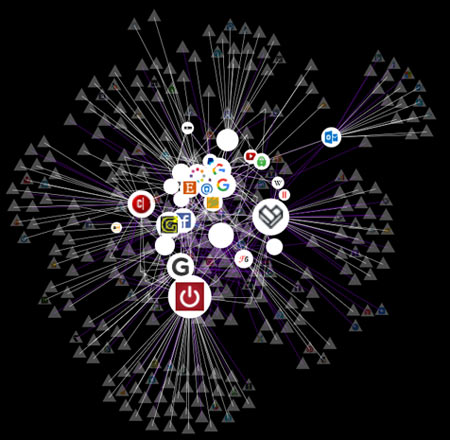 Despite what some think, the internet is not private. Anonymous browsing and Internet Privacy are almost non-existent in today's online world. Websites collect personal information on every visit without your knowledge. Despite the free label, services come at a cost, and in many cases, it’s a lack of privacy.
Despite what some think, the internet is not private. Anonymous browsing and Internet Privacy are almost non-existent in today's online world. Websites collect personal information on every visit without your knowledge. Despite the free label, services come at a cost, and in many cases, it’s a lack of privacy.
The primary driver is the advertising industry. Most websites get paid if an ad is clicked or the product is purchased, not just for exposure. As a result, they want promotions that are relevant to the user. They get paid, and the user gets to see the products they’re interested in. It seems advantageous to both parties.
However, to target these ads, agencies need information about a website’s users. Companies like Facebook embed trackers across the web to build a detailed profile of individuals. This includes things like your gender, age, location, and websites you frequent. Information from multiple ad agencies can then be combined to build a detailed picture of your interests and personality.

Firefox's Lightbeam Plugin provides a visual map of sites visited during our session
Here’s the result of two hours of browsing activity with the Lightbeam plugin. The circle articles are sites we visited, while the triangles are third parties. Together, they can create an interconnected web of information. Visiting just 32 sites fed 371 third parties data.
They can do this across the web through identifying information like your IP address. When you connect to a network, your device is given a unique string of numbers by the ISP or mobile service provider. These can be cross-referenced across the internet to find your browsing habits.
If that’s not enough, there are also government agencies to worry about. IP addresses usually give websites a rough idea of your location by pointing to your service provider. That’s not a barrier for government. They can ask the ISP who the IP was assigned to and find your name and address. You would think that such power would be used sparingly, but unfortunately, it’s not.
Former NSA contractor Edward Snowden revealed that major powers are spying on citizens across the world on an unprecedented level. Authorities request all that tracking data we mentioned earlier and combine it with information from the internet service provider (ISP). From 2011-2012, Australian agencies requested ISP logs over 300,000 times. This can include every website the user has visited over a period of years.
And that’s someone who has the country’s best interests at heart. This kind of information is also accessible to a number of people who work for the ISP. Earlier this year, an ex-technician for Verizon pleaded guilty to selling phone call and location information to a private investigator. Web browsing information could equally be sold off to the highest bidder.
And that’s assuming they even have to buy it in the first place. In 2012, internet activist group anonymous hacked into the servers of telecommunications company AAPT. They stole over 40GB of information relating to business customers to show that the logs are not always safe. A redacted copy of the data was later published online.
What is the Threat?
With so many parties interested in such data, anonymous browsing is becoming difficult. The sad fact is that without protection from the Best VPN providers, you aren’t truly safe.
Firstly, there’s the threat of this information falling into the hands of hackers. Imagine a person with malicious intent having a record of your name, address, interests, habits, and every website you’ve been to. It could easily be used to blackmail someone or make threats to their friends and family.
It can also be used to identify potential weak points in your security. For example, if you regularly visit an insecure site, it could be hacked with an end goal of getting to you. Tools such as a key logger could then be used to collect usernames, passwords, and credit card data.
Furthermore, such access can be used for types of identity theft. Combined with an email account, an attacker has access to basically everything. Password resets for various accounts, name, age, date of birth. Bank details can be used to place illegal purchases on your behalf or commit fraud. Most of our lives are stored online, and the attack could gain access to all of it.
The same methods can be used by authorities in oppressive regimes. Even if the current government protects its citizens from such things, a power shift could change that. Because tracking information and ISP logs are kept for a long time, the data will still be around years into the future.
Then there’s the issue of illegal activities. Previously, nobody would know if you were breaking the law in the privacy of your own home. However, with the increase in logs, activities like torrenting can result in warnings, loss of service, or huge fines.
Without a VPN, torrents can be traced straight back to the user. Copyright holders hire companies to search through swarms of people torrenting their property. With an IP address, they can request a user’s details from the ISP and pursue legal action. The ISP is often compelled to do this or face legal repercussions themselves.
Though torrenting is a morally grey area, this can also affect customers who have done nothing wrong. WiFi networks can be hacked or information can be incorrect. In 2010, 53-year-old Cathi Paradiso ran into this problem when she was accused of downloading 18 films and TV shows illegally. In reality, her IP address was identified incorrectly, and her internet access cut off unjustly. It’s clear that even if you’re a regular internet user, anonymous browsing has its benefits.
What is Anonymous Browsing and How Does it Help?
Anonymous browsing is usually achieved by routing a normal internet connection through a virtual private network. We won’t go into too much detail here, as it’s been already covered in our Beginner’s Guide to VPNs.